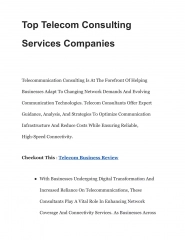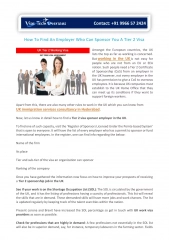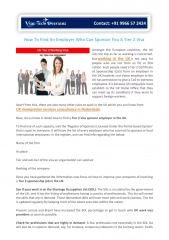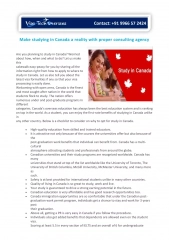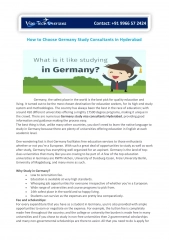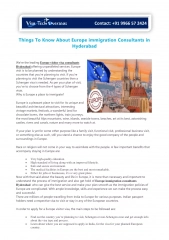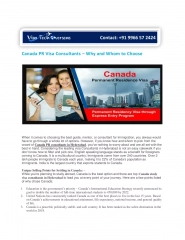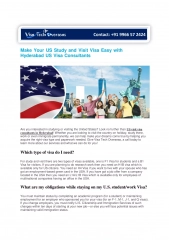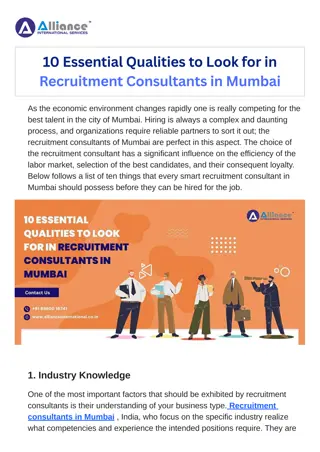Meet the Consultants:
This content showcases the consultants in Laboratory Medicine, detailing various specialties such as Autopsy, Chemistry, Immunology, Microbiology, Surgical Pathology, and more. It also provides insights into service duties, consultation, and must-consult lists for specific protocols and reactions. The information is accompanied by imagery depicting the different floors and areas within the laboratory setting, along with a focus on patient care, clotting factors, and resource management.
Download Presentation

Please find below an Image/Link to download the presentation.
The content on the website is provided AS IS for your information and personal use only. It may not be sold, licensed, or shared on other websites without obtaining consent from the author.If you encounter any issues during the download, it is possible that the publisher has removed the file from their server.
You are allowed to download the files provided on this website for personal or commercial use, subject to the condition that they are used lawfully. All files are the property of their respective owners.
The content on the website is provided AS IS for your information and personal use only. It may not be sold, licensed, or shared on other websites without obtaining consent from the author.
E N D
Presentation Transcript
Meet the Consultants: Lab Medicine
Laboratory Medicine and Anatomic Pathology Autopsy Chemistry/Immunology Cytology Microbiology/Virology Surgical Pathology Bone and Soft Tissue Breast Pathology Dermatopathology Genitourinary GI and Liver Gynecologic Head, Neck & Endocrine Transfusion Medicine Apheresis Blood Bank Medical Renal Neuropathology Ophthalmic Pediatric Thoracic Hematology/Flow Cytometry Tumor Profiling Hematopathology Molecular Diagnosis Bioinformatics
55 Park Street 6th Floor: Microbiology Virology 5th Floor Processing Chemistry Hematology 4th Floor Hematopathology Immunology Flow Cytometry Special Chemistry 3rd Floor Blood Bank Stem Cell Lab Other Locations: NP 8 Apheresis Clinic Sample Delivery Bags and Tags for Transfusion Reactions
Service Duties Patient Care Sign-Out Critical Values Approval of Off-Label Use of Clotting Factors Consultation Laboratory Management CLIA Regulations Evidence-Based Practice Protocols QC/QA/QI Proficiency Testing Resource Management Lab Staffing Testing Schedules
MUST Consult List Massive Transfusion Protocols (MTPs)* Transfusion Reactions* Urgent Apheresis, e.g.: Acute Chest Syndrome in Sickle Cell Disease Thrombotic Thrombocytopenic Purpura Off-label clotting factor approval* *You call us (preferred) or we call you https://www.turbosquid.com
Bad Consult Example On a peripheral smear order: Smear morphology Blood info? ? Clark, William. (2016) Contemporary Practice in Chemical Chemistry, 3rd Edition. AACC Press.
Good Consult Example Indication for testing in chart/lab request Peripheral smears Flow cytometry Give clinical context I have a question about _____ testing One-liner Have MR and/or specimen ID ready Give contact information (full name and number) for follow-up Be as specific as possible Always better to call ahead Especially for Blood Bank and Apheresis https://www.arrowheadscientificinc.com
19-0000000 19 -000 0000
General Lab Info and Tips Ordering, Specimen Handling, and Critical Values
Lab Tips - Ordering For: Missing Orders Miscellaneous Orders Special Send-Out Requests Order miscellaneous blood/non- blood test and enter into comments: Name of Lab Name of Test Lab ID/Test Code First Quest Then ARUP Mayo Clinic NMS Cannot send to research labs
For other questions about tests Customer Service Hotline: 203-688-2444
Lab Tips - Specimen Handling Send separate specimens to Lab Medicine and Pathology when possible Coordinate with Lab Medicine and Pathology if shared specimen Especially if after hours Send samples in lab-approved containers Send representative samples of larger specimens If urgent, hand-deliver it to the lab Always better to call ahead
Critical Values Regulated at the federal and state level Ordering provider or other responsible provider must be contacted The patient name, test name, and value must be repeated by the provider The provider s name and contact number must be recorded If there is a note in the chart with patient name, test name, and value, can be used as surrogate for phone call
Transfusion Medicine Platelets, MTPs, Transfusion Reaction Work-Ups, and Apheresis Consults
Transfusion Medicine - Platelets Basics 1 pool = 1 bag = 4-6 units Expire in 5 days One unit should increase platelet count 5,000-10,000/uL One pool should increase platelet count 20,000-50,000/uL Blood Bank Management Received on Day 3 ~40 units in YNHH Blood Bank Turnover ~30 units per day
Transfusion Medicine - Platelets Thresholds for platelet transfusion based on AABB and ASCO guidelines and interdisciplinary agreement: >10,000/uL for bleeding prophylaxis >20,000/uL for bleeding prophylaxis with fever >25,000/uL for line placement >50,000/uL for bleeding, invasive procedure, adult lumbar puncture >100,000/uL for neurological bleed Contraindicated in HIT and TTP
Transfusion Medicine - MTPs What is in an MTP box? 6 units RBCs, 6 units plasma, 1 pool platelets (4-6 units) 1:1:1 You will be getting a call To obtain clinical information To confirm active Type and Screen Draw before administering blood if possible To confirm recent CBC, coagulation studies, and fibrinogen To receive an estimate of blood product use To answer whatever questions you might have
Transfusion Medicine Transfusion Reactions Transfusion-associated circulatory overload (TACO) Transfusion-related acute lung injury (TRALI) Allergic reaction (mild vs. severe) Acute hemolytic transfusion reaction (AHTR) Delayed hemolytic transfusion reaction (DHTR) Febrile non-hemolytic transfusion reaction (FNHTR) Septic transfusion reaction Initiate a Stop the transfusion! reaction work-up! These reactions are dose-dependent .
Transfusion Medicine Transfusion Reactions Order a post-transfusion reaction sample in epic Pink top tube Transfusion Reaction ROS AMS Chest pain Dyspnea Abdominal pain Back/flank pain Fevers/chills/rigors Hives/rash/pruritis/edema Infusion site pain Walk the bags and tags back to the blood bank Don t use the tube system! Have the following information ready: Clinical history Reaction signs/symptoms Product(s) Timing of transfusion Pre-transfusion medication Post-transfusion medication
Transfusion Medicine Transfusion Reactions On the phone we will: Confirm return of bags/tags Make an initial assessment if possible Recommend additional laboratory studies Recommend therapies Address questions about continued transfusion In the lab we will: Perform clerical checks Assess for hemolysis Retype the patient Rescreen the patient Assess for antibody binding to red cells (DAT) Characterize antibody binding to red cells +/- Culture the product Perform ancillary testing
Apheresis Inpatient consultations Red cell exchange for ACS in SS disease Plasma exchange for TTP Organ rejection Call in addition to placing consult We are not contacted by consult call center Transfusion Fellow will evaluate: Indication Safety Access Reach out early to make a plan Consider timing of medication that may be removed by apheresis www.terumobct.com
Hematology Peripheral Smears and Special Coagulation Studies
Hematology - Peripheral Smear Considerations for MD smear interpretation Specific clinical question that requires morphologic interpretation Smear cannot assess function Quantitation can be assessed with manual differential E.g. 34 year-old female with rheumatoid arthritis and acute on chronic anemia, ACD vs. iron deficiency Laboratory studies are more sensitive and specific Anemia Red cell indices, iron studies, reticulocyte indices, B12, folate Hemolysis LDH, haptoglobin, indirect bilirubin No other clear/confounding etiology GI bleed and anemia Acute infection/steroids and leukocytosis Thrombocytopenia Reticulated platelet studies HIT Panel Transfusion effects
Hematology - Special Coagulation Testing Tube Fill Errors Clinical Context Medication Effects Lupus Anticoagulant Testing Transfusion Effects
Microbiology Special Culture Orders, Mixed Cultures, Susceptibility Requests, Stool Pathogen Panel
Microbiology Special Culture Orders Search culture in the lab manual to find special culture orders: Note: Candida will grow on routine blood cultures No longer accepting oral/respiratory specimens for Actinomyces culture
Microbiology Special Culture Orders If you suspect a select agent: Call Infection Control and the Lab!
Microbiology Mixed Cultures Usually mixture of Gram-positive, Gram-negative, aerobic, and anaerobic organisms Lab works-up predominating organisms Lab checks for individual organisms of clinical importance as per comment
Microbiology Susceptibility Requests Testing is limited by guidelines, methods, equipment, and organism Guidelines incorporate clinical data to avoid treatment errors based on in vitro results Courtesy of Dr. David Peaper
Microbiology - Stool Pathogen Panel Included Genera: Community acquired diarrheal organisms Salmonella Shigella Campylobacter STEC (Shiga Toxin) Yersinia Vibrio Very low pre-test probability for anyone in the hospital greater than 3 days Will be cancelled if hospitalized >3 days as per comment


